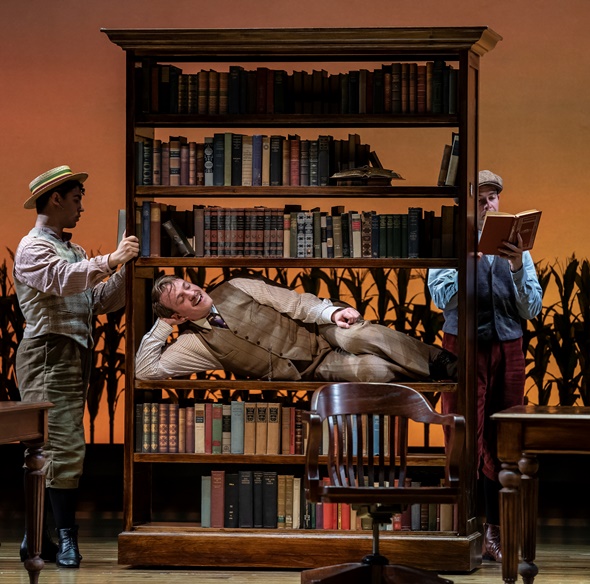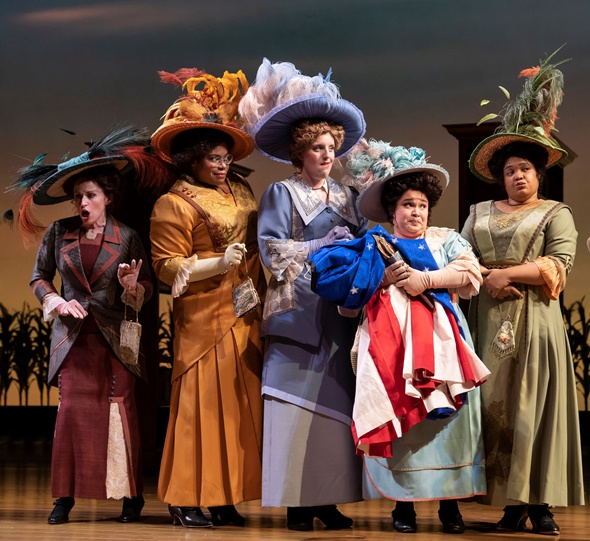‘The Music Man’ at Goodman: He’s a what, he’s a what? He’s a music man. No, he ain’t.

Prof. Harold Hill (Geoff Packard) strikes up a fantasy band among the youth of River City, Iowa, in “The Music Man.” (Production photos by Liz Lauren)
“The Music Man” by Meredith Willson. At Goodman Theatre, extended through Aug. 18. ★★
By Lawrence B. Johnson
Yes, my friends, we got trouble, right here in Windy City. I’m talkin’ about a Goodman Theatre production of “The Music Man” – a musical, the last I heard – that’s about as musical as Amaryllis’ cross-hand piece at the piano. And by the way, the show also lacks an actor in the title role with a real feel for that two-bit, gol-dang, smooth-talkin’, tin-horn, two-timin’ salesman: someone, in short, who knows the territory.

Music man Harold Hill (Geoff Packard) wants to harmonize with Marian (Monica West), the town’s music teacher and librarian.
This enterprise offers a bristling reminder that musicals are deceptive. The really great ones – and “The Music Man” stands among the best – are very hard to do well. A musical is more than a play with songs; it is a play transmuted by music, by smart lyrics that take wing on musical sensibility. The Goodman’s attempt at “The Music Man” comes within vivid memory of this spring’s brilliant account of “West Side Story” at the Lyric Opera of Chicago: great singing, ambitious staging, marvelous theater.
But whereas an opera company thinks first about the music, specifically the singers, a company devoted primarily to plays is reaching when it ventures into a musical. The vocal heart of “The Music Man” beats within the character of Marian, the strait-laced librarian who quickly sees through the phony music peddler who decides to give Iowa a try. Composer-librettist Meredith Willson gave Marian two gorgeous songs – “Goodnight, My Someone” and “Till There Was You.” On opening night at least, Monica West did not meet the vocal requirements of music as exacting as it is disarming.
And partly owing to the production’s general sense of pushing through and hitting marks and moving on, I never grasped much chemistry between West’s Marian and Geoff Packard’s Prof. Harold Hill, the career con man who meets his Waterloo in River City. But then Packard largely seemed to be walking through the part. The bar was set high by the bright opening number on the train, where a passel of traveling salesmen debate the economics of their trade before turning to the subject of the notorious Harold Hill; then Packard’s semi-polished delivery of “Trouble” – the iconic number that raises the moral hazards of the town’s new pool table – ratcheted hopes down several notches.
He had the monologue down, the words. But not the nuance, the gamesmanship, the calculated effect. Rich as the text is, there’s so much more to be mined by the voice: It’s a grifter’s bounty. Likewise, Willson’s glittering “Marian the Librarian” – rhyming wit worthy of Stephen Sondheim – was more rewarding in director Mary Zimmerman’s staging than in any of Packard’s rhetorical shape-shifting.
The show’s real musical strength lies in a terrific barbershop quartet and the four female busybodies in gloriously plumed headgear whose gossipy “Pickalittle, Talk-a-Little” arguably took the night’s prize. And two lovely acting performances proved crucial to keeping this enterprise afloat: Heidi Kettenring’s droll turn as Eulalie Mackecknie Shinn, the mayor’s dour wife who imagines herself a terpsichoric artiste, and Mary Ernster, whose radiantly ironic portrayal of Marian’s Irish mother stole every scene she was in.
Ron E. Rains offers an uncertain turn as the bumbling town mayor who immediately sees through Harold Hill’s charade even if his mental synapses occasionally get crossed up. At times, Rains expanded into this broadly funny curmudgeon with deft assurance; other times, he seemed to push too hard for visibility and a laugh. As the traveling anvil salesman, who literally drags his product behind him in a bag in his determined quest to settle Harold Hill’s hash once and for all, Matt Crowle had me laughing a lot.
Visually, the Goodman production designed by Daniel Ostling is something less than fetching. It looks budget driven; this for a show that’s likely to bring in the bucks second only to “A Christmas Carol” in the Goodman season. Ya gotta love Ana Kuzmanic’s 1912 Iowa costumes, though.
While there’s a palpable ensemble spirit to this venture, the turn-of-the-century Iowa essence seems to have eluded director Zimmerman, a native of Lincoln, Neb. Even allowing that she doesn’t go back that far, somewhere along the line, the director apparently should have had a heart-to-heart with Packard, and maybe Rains, about life in the great Midwest way back in the day. That conviction, that stubborn ingrained truth, is missing here.
Related Link:
- Performance location, dates and times: Details at TheatreInChicago.com



